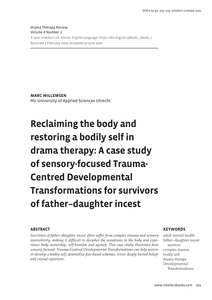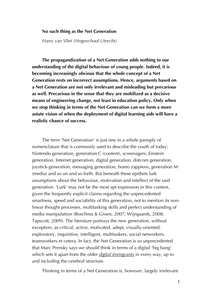Vrijdag publiceerde ik al een eerste overzicht van de mogelijke doorwerking van de tweede Corona-epidemie: die van angst en onzekerheid. Hierbij versie 1.1., waarin met name wat toevoegingen zijn aangebracht op gebied 1 (mate van preventie en beveiliging door het publiek), gebied 6 (criminaliteit en onveiligheid) en gebied 7 (houding t.a.v. bestuur en beleid). Ik heb met name meer aandacht geschonken aan de mogelijkheid van het optreden van maatschappelijke onrust in de vorm van zogenaamde moral panics en forward panics. Ik ga er niet vanuit dat die zich snel voor zullen voordoen, maar voor het scenariodenken is het wél nodig er rekening mee te houden. Ik heb ook aangegeven wat – op basis van de combinatie van wetenschappelijke inzichten en actualiteit – daarbij zoal triggers zouden kunnen zijn. Verdere – vooral ook uitgebreidere – updates volgen de komende dagen.
IMAGE
De corona-pandemie gaat vergezeld van een tweede pandemie: die van angst en onzekerheid. Die vervult een sleutelrol in zowel de aanpak van de volksgezondheidscrisis áls in de financieel-economische crisis. Vanaf het begin van de crisis vertaal ik de wetenschappelijke inzichten over de doorwerking van die angst en onzekerheid in compacte mindmaps met korte toelichtingen Inmiddels is versie 4.0 beschikbaar, die u hier kunt downloaden: Mindmaps maatschappelijke doorwerking angst voor corona 4.0 Ik sta vanzelfsprekend open voor toelichting of feedback.
DOCUMENT

Writing expressive dialogues can be used to assist individuals in developing their career identities – that is: stories that are needed to help people position themselves in relation to the current labour market. Writing expressive dialogues entails having written conversations with various parts of us – much like a playwright does with his characters – and making developmental gains in the process. In Dialogical Self Theory (DST) terms, it means talking to and with various I-positions on the page, perhaps forming coalitions, discovering counter positions, and innovating and integrating the self (Hermans & Hermans-Konopka, 2010, p. 228-234). And as the playwright Miller suggests in the above quote, the creation of identity is an interactive process between self and others. LinkedIn: https://www.linkedin.com/in/reinekke-lengelle-phd-767a4322/
DOCUMENT

Survivors of father–daughter incest often suffer from complex trauma and sensory insensitivity, making it difficult to decipher the sensations in the body and experience body ownership, self-location and agency. This case study illustrates how sensory focused, Trauma-Centred Developmental Transformations can help restore or develop a bodily self, desensitize fear-based schemas, revise deeply buried beliefs and extend repertoire.
DOCUMENT

From the article: Abstract The Information Axiom in axiomatic design states that minimising information is always desirable. Information in design may be considered to be a form of chaos and therefore is unwanted. Chaos leads to a lack of regularities in the design and unregulated issues tend to behave stochastically. Obviously, it is hard to satisfy the FRs of a design when it behaves stochastically. Following a recently presented and somewhat broader categorization of information, it appears to cause the most complication when information moves from the unrecognised to the recognised. The paper investigates how unrecognised information may be found and if it is found, how it can be addressed. Best practices for these investigations are derived from the Cynefin methodology. The Axiomatic Maturity Diagram is applied to address unrecognised information and to investigate how order can be restored. Two cases are applied as examples to explain the vexatious behaviour of unrecognised information.
MULTIFILE

The propagandization of a Net Generation adds nothing to our understanding of the digital behaviour of young people. Indeed, it is becoming increasingly obvious that the whole concept of a Net Generation rests on incorrect assumptions. Hence, arguments based on a Net Generation are not only irrelevant and misleading but precarious as well. Precarious in the sense that they are mobilized as a decisive means of engineering change, not least in education policy. Only when we stop thinking in terms of the Net Generation can we form a more astute vision of when the deployment of digital learning aids will have a realistic chance of success.
DOCUMENT

Objective: The majority of parents with a disabled child experience chronic sorrow, characterized by recurrent feelings of grief and loss related to their child’s disability. There is a significant lack of research on parents’ lived experiences of chronic sorrow, which limits our ability to understand parents’ needs and provide proper support. Design: Interpretative Phenomenological Analysis (IPA) was conducted based on in-depth interviews with six parents of severely disabled children. Results: In the literature on chronic sorrow, an important aspect has been consistently overlooked: the particular position of being a parent, experiencing an awareness of being ultimately responsible for their children. The analysis revealed how this awareness, experienced as a deeply felt ethical commitment, unconditional, largely in isolation, and without a limit in time, shaped the experience of chronic sorrow. Because of this awareness, the parents experienced themselves facing a Herculean task of navigating their intricate motions while struggling to maintain their ability to function. Conclusions: By revealing the importance of considering the unique parental position, the study enriches the concept of chronic sorrow, simultaneously offering insights into what it means to be a parent of a disabled child. These insights can improve care professionals’ responsiveness to parental needs.
DOCUMENT

In this chapter, we propose that the democracy we wish to see out in the world is influenced by the quality of our own “inner democracies”—that is: the quality of the democracies among and between the selves or voices in the landscape of the self. We must find ways out of the I-prisons we experience and perpetuate. With this in mind, we propose that ”writing the self,” a method whereby creative, expressive, and reflective writing is used to cultivate an internal dialogue and construct a new identity narrative (Lengelle, 2014), can assist in reshaping our stories about ”the Other and ourselves” and can contribute to personal and cultural healing and reconciliation. The inner dialogue reconciled is foundational for the external dialogue at the heart of global citizenship within education. Indeed, as Schellhammer argues, we must cultivate the self in order to become inter-culturally competent, and this includes facing shadow aspects through truthful dialogues with the self and caring for the self. https://doi.org/10.1007/978-3-319-62861-5_6 LinkedIn: https://www.linkedin.com/in/reinekke-lengelle-phd-767a4322/
MULTIFILE

Introduction: From the patient and staff perspective, care delivery for patients experiencing a mental health problem in ambulance and emergency department (ED) settings is challenging. There is no uniform and internationally accepted concept to reflect people with a mental health problem who require emergency care, be it for, or as a result of, a mental health or physical health problem. On initial presentation to the emergency service provider (ambulance or ED), the cause of their healthcare condition/s (mental health and/or physical health) is often initially unknown. Due to this (1) the prevalence and range of underlying causes (mental and/or physical) of the patients presenting condition is unknown; (2) misattribution of physical symptoms to a mental health problem can occur and (3) diagnosis and treatment of the initial somatic complaint and cause(s) of the mental/physical health problem may be hindered.This study will name and define a new concept: 'mental dysregulation' in the context of ambulance and ED settings. Methods and analysis: A Delphi study, informed by a rapid literature review, will be undertaken. For the literature review, a steering group (ie, persons with lived experience, ED and mental health clinicians, academics) will systematically search the literature to provide a working definition of the concept: mental dysregulation. Based on this review, statements will be generated regarding (1) the definition of the concept; (2) possible causes of mental dysregulation and (3) observable behaviours associated with mental dysregulation. These statements will be rated in three Delphi rounds to achieve consensus by an international expert panel (comprising persons with lived experience, clinicians and academics). Ethics and dissemination: This study has been approved by the Medical Ethical Committee of the University of Applied Sciences Utrecht (reference number: 258-000-2023_Geurt van der Glind). Results will be disseminated via peer-reviewed journal publication(s), scientific conference(s) and to key stakeholders.
DOCUMENT

Discussions about the importance of the built environment for healthcare delivery extend at least as far back as Hippocrates 1 (400 BC). The iconic Florence Nightingale (1859) also strongly believed in the influence the indoor environment has on the progress of disease and recovery. Today, the role of the built environment in the healing process is of growing interest to healthcare providers, environmental psychologists, consultants, and architects. Although there is a mounting evidence 1 linking healthcare environments to health outcomes, because of the varying quality of that evidence, there has also been a lack of clarity around what can and cannot be achieved through design. Given the ageing of society and the ever increasing numbers of persons with dementia in the Western World, the need for detailed knowledge about aged care environments has also become increasingly important. The mental and physical health state of these persons is extremely fragile and their needs demand careful consideration. Although environmental interventions constitute only a fraction of what is needed for people with dementia to remain as independent as possible, there is now sufficient evidence (2, 3) to argue they can be used as a first-line treatment, rather than beginning with farmalogical interventions.
DOCUMENT
